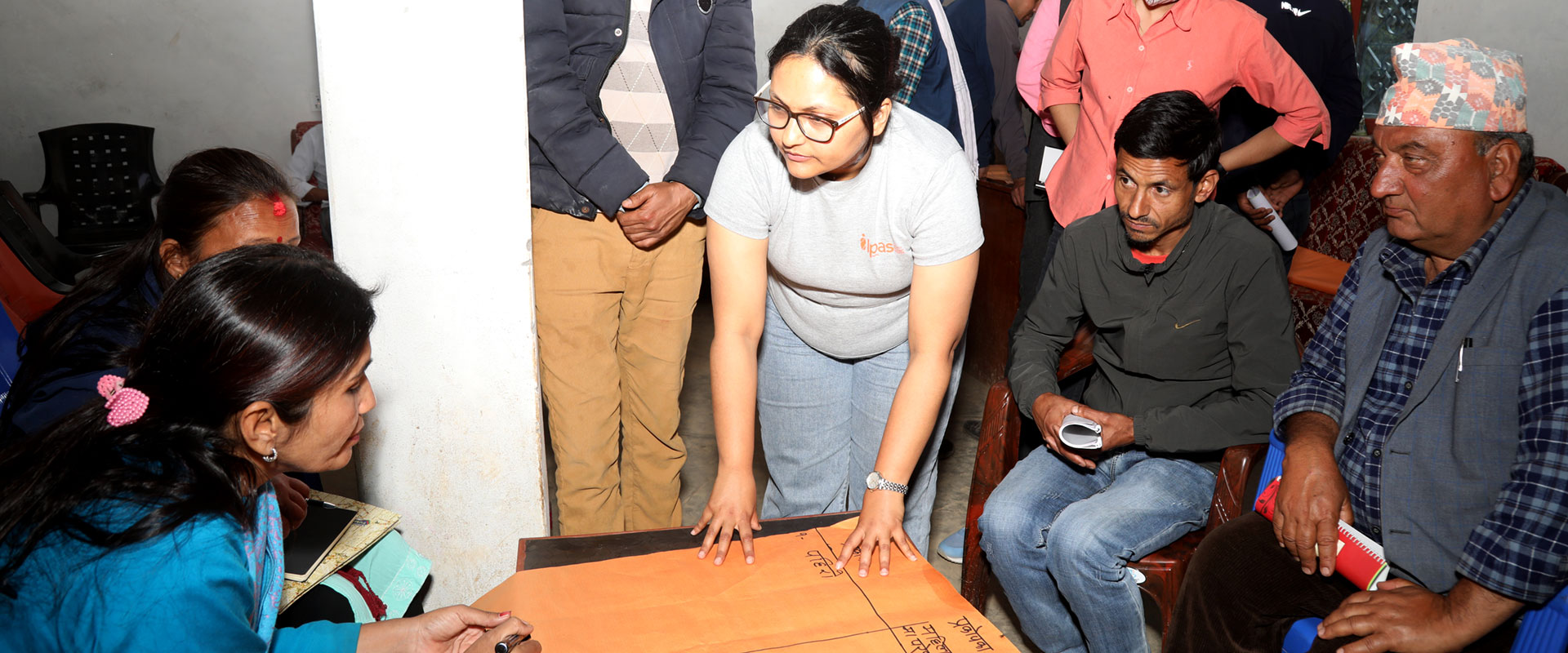Khusbu Poudel, Ipas Nepal’s program coordinator for climate justice, gender, and sexual and reproductive health and rights, didn’t fully grasp the extent to which women’s and girls’ bodily autonomy is affected during climate crises until she joined Ipas two years ago. Not even her background in studying climate change had prepared her for this.
Khusbu is a graduate of environmental science and natural resources from Kathmandu University and has 10 years of professional experience working on various research and development projects related to environment and climate change in Nepal.

“Working with Ipas and witnessing the stark reality of how climate-induced disasters disrupt access to reproductive health care made me understand better how the two are interlinked,” says Khusbu. “It clicked with me then: Women need contraceptives and abortion care just as much as they need food and clean water during emergencies like floods.”
Ipas Nepal has been a leader in pushing for gender and sexual and reproductive health and rights (SRHR) to be part of climate policies and actions, both in Nepal and around the world. Khusbu has been a key part of this work since joining Ipas. She’s represented Ipas Nepal at important national and international events like the UN Framework Convention on Climate Change (UNFCCC) Conference of Parties (COP). She will represent Ipas at COP29 in Baku, Azerbaijan.
Khusbu shared insights into her career journey to mainstream gender, SRHR and climate change at Ipas.
What inspired you to take up the job at Ipas Nepal and how are you contributing to climate justice work in Nepal?
I have been working on environment and climate justice for several years. The work at Ipas Nepal was innovative particularly on mainstreaming gender, sexual and reproductive health and rights and climate justice which was something I had never thought of and that inspired me to take this role.
Nepal is among the 10 countries in the world most impacted by climate change for the last 19 years, according to Germanwatch. Since climate crises disproportionately affect women and girls and can keep them from getting the reproductive health care they need, it was critical to have someone on staff whose focus is on integrating the impact of climate change into all our work.
As a program coordinator for gender, sexual and reproductive health and rights (SRHR), and climate change, I work with my team to plan, implement, and monitor programs that promote climate justice and resilient health systems in Nepal. We also work to scale up these efforts.
I’ve had the opportunity to share research on how climate change impacts the SRHR of women and girls. I’ve presented the results of Ipas Nepal’s work integrating gender, SRHR, and climate change at important events like the UN Climate Change Conference (COP28), the SRHR and Climate Justice Coalition , and Women Deliver.
Since joining Ipas Nepal, I’ve become even more passionate about combining gender, SRHR, and climate justice in our work.
Why is it important to mainstream gender, SRHR and climate in the context of Nepal?
One of the studies of Ipas Nepal suggests extreme weather events have a disproportionate impact on women and girls, affecting their workloads, both inside and outside the home. It also has an impact on their autonomy in decision-making around sexual and reproductive health care. However, due to lack of evidence, advocacy efforts and technical support, the mainstreaming of gender, SRHR in climate policy and actions are less spelled out and prioritized in the government’s policy, plan and program.
You will be representing Ipas at COP29. Why is this an important platform for Ipas?
It’s important for Ipas because it provides a global platform to integrate health and gender into climate action. Historically, health and specifically sexual and reproductive health and rights, including safe abortion, have been overlooked in climate negotiations. Gender issues were only prioritized at COP26, and began to be addressed substantively in 2010. For organizations like Ipas, which focuses on expanding abortion access, COP presents an opportunity to advocate for these critical intersections, ensuring that gender and health, including sexual and reproductive health, are not merely afterthoughts but recognized as core components of climate change response. This integration is essential to advancing holistic and equitable climate solutions that benefit the health and well-being of vulnerable populations.
Ipas’s role at COP 29
At COP28, Ipas actively participated in and advocated for integrated gender, SRHR, and climate actions at several high-level and side events, including “Putting Health at the Center of Climate Change” at the Nepal Pavilion, “The Nexus Between Climate, Gender, and Health: The Youth Perspective,” and “Exploring the Burden of Climate Change on Health.” Post COP28, Ipas Nepal is providing technical support to the Government of Nepal to fulfill its commitment from COP28 events and continue efforts to integrate gender, SRHR and climate change.
Leading up to the COP29, Ipas Nepal organized several events to elevate SRHR within climate negotiations. With the support of Nepal’s Ministry of Forest and Environment and the Women and Gender Constituency (WGC), Ipas held a virtual session on “Gender in Climate Negotiation” for women delegates, focusing on gender perspectives in climate decisions and COP29 preparations. Additionally, in partnership with various stakeholders, Ipas convened a roundtable discussion to address gender and intersectional approaches, emphasizing women’s diverse leadership and priorities at COP29.
Ipas also contributed to Nepal’s national position paper on gender for COP29, working alongside the Climate Change Management Division and other organizations. Participating in a regional workshop organized by Population Council Consulting, Ipas shared evidence on the intersection of climate change and SRHR in South Asia. At COP29, Ipas will track developments in gender and health, participating inside events and advocacy efforts to spotlight these areas in climate discussions. We are seeking an observer status, with the aim of greater involvement in negotiations, amplifying SRHR, health, and youth voices in climate action.
Ipas Nepal conducted research to explore how climate change impacts the ability of women and girls to get the reproductive health care they need. Can you tell us about some of the key findings?
The harsh truth from the findings is that extreme weather events hit women and girls the hardest. We did interviews and focus group discussions with nearly 400 women and girls who live in two river basins that are particularly vulnerable to increased flooding, landslides and drought. We found that displacement and male migration due to climate change have raised women’s workloads by 61%, while 64% reported interrupted antenatal and postnatal care, and inaccessible health care during the rainy season has elevated complications and maternal death risks. Post-disaster, 82% of women feared for their children’s safety and 21% experience gender-based violence. The findings are alarming, and it calls for an urgent need to invest in gender equity and access to reproductive health care in climate-affected areas—the time to act is now.
To bridge these gaps identified by the research, Ipas Nepal is working to:
- Integrate gender and SRHR into local climate policies
- Support the implementation of local adaptation plans
- Advocate for gender and SRHR inclusion in national adaptation plans
- Engage with climate stakeholders to emphasize the importance of investing in gender, SRHR, and climate adaptation


